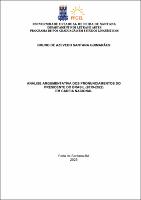| Compartilhamento |


|
Use este identificador para citar ou linkar para este item:
http://tede2.uefs.br:8080/handle/tede/1875| Tipo do documento: | Tese |
| Título: | Análise argumentativa dos pronunciamentos do presidente do Brasil (2019-2022) em cadeia nacional |
| Autor: | Guimarães, Bruno de Azevedo Santana  |
| Primeiro orientador: | Piris, Eduardo Lopes |
| Resumo: | A argumentação não é universal e atemporal. Os argumentos e seus esquemas argumentativos são determinados não pelo orador do discurso, mas pela corrente dóxica na qual ele se inscreve. No Brasil, o chamado discurso bolsonarista notabilizouse por reunir discursos intolerantes e de ódio que até então estavam dispersos, o que justifica a realização de pesquisas sobre a reprodução dos argumentos de intolerância e de ódio no discurso do então presidente da República, indiciado no Relatório da CPI da Covid-19, por 9 crimes cometidos por seu governo durante a pandemia. Assim, apresentamos a nossa pesquisa de doutorado, cujo objetivo geral é analisar os argumentos e esquemas argumentativos produzidos pelos pronunciamentos em cadeia nacional do presidente do Brasil, no período da pandemia, a fim identificar como estes argumentos e esquemas argumentativos funcionam no pronunciamento proferido pelo presidente. Além disso, do ponto de vista analítico, contextualizamos cada pronunciamento como forma de situar o período histórico que o Brasil e o mundo enfrentavam e mostramos como os argumentos e esquemas argumentativos funcionam na construção do orador e do auditório em relação às crenças e valores compartilhados entre os sujeitos do discurso. Do ponto de vista teórico, esta pesquisa trata os fenômenos argumentativos descritos pela Nova Retórica de Perelman, assumindo o ponto de vista de comentadores como propuseram Amossy (2020), Grácio (2021) e Toulmin (2008). O corpus constitui-se a partir dos pronunciamentos presidenciais proferidos durante a pandemia em cadeia nacional de rádio e televisão, cujos textos e vídeos estão disponibilizados no Portal da Presidência da República. Neste trabalho, mostramos como o pronunciamento presidencial, em época de pandemia, tem impacto direto sob a sociedade a partir do medo alastrado pelo coronavírus. Ademais, a pesquisa contribui de forma assertiva para os estudos da argumentação e para a reflexão sobre as características do discurso de ódio e da intolerância presentes no discurso político, especialmente quando o ator político enuncia de uma posição de poder. |
| Abstract: | Arguments are not universal and timeless. Arguments and their argumentative schemes are determined not by the speaker of the speech, but by the doxic current in which it is inscribed. In Brazil, the so-called Bolsonarist discourse became known for bringing together intolerant and hate speeches that had previously been dispersed, which justifies the conduct of research on the reproduction of arguments of intolerance and hate in the speech of the then president of the Republic, indicted in the Covid-19 CPI Report for 9 crimes committed by his government during the pandemic. Thus, we present our doctoral research, whose general objective is to analyze the arguments and argumentative schemes produced by the Brazilian president's nationally broadcast speeches during the pandemic period, in order to identify how these arguments and argumentative schemes function in the speech given by the president. Furthermore, from an analytical point of view, we contextualize each speech as a way of situating the historical period that Brazil and the world were facing and we show how arguments and argumentative schemes work in the construction of the speaker and the audience in relation to the beliefs and values shared between the subjects of the discourse. From a theoretical point of view, this research addresses the argumentative phenomena described by Perelman's New Rhetoric, assuming the point of view of commentators as proposed by Amossy (2020), Grácio (2021) e Toulmin (2008). The corpus is constituted from the presidential speeches made during the pandemic on national radio and television, whose texts and videos are available on the Portal of the Presidency of the Republic. In this work, we show how the presidential speech, in times of pandemic, has a direct impact on society from the fear spread by the coronavirus. Furthermore, the research contributes effectively to studies of argumentation and to reflection on the characteristics of hate speech and intolerance present in political discourse, especially when the political actor speaks from a position of power. |
| Palavras-chave: | Argumentação Esquemas Argumentativos Discurso Político Pronunciamento Presidencial Pandemia Argumentation Argumentative Outlines Political speech Presidential Statement Pandemic |
| Área(s) do CNPq: | LINGUISTICA, LETRAS E ARTES::LINGUISTICA |
| Idioma: | por |
| País: | Brasil |
| Instituição: | Universidade Estadual de Feira de Santana |
| Sigla da instituição: | UEFS |
| Departamento: | DEPARTAMENTO DE LETRAS E ARTES |
| Programa: | Programa de Pós-Graduação em Estudos Linguísticos |
| Citação: | GUIMARÃES, Bruno de Azevedo Santana. Análise argumentativa dos pronunciamentos do presidente do Brasil (2019-2022) em cadeia nacional, 2024, 219 f., Tese (doutorado) - Programa de Pós-Graduação em Estudos Linguísticos, Universidade Estadual de Feira de Santana, Feira de Santana. |
| Tipo de acesso: | Acesso Aberto |
| URI: | http://tede2.uefs.br:8080/handle/tede/1875 |
| Data de defesa: | 24-Mar-2024 |
| Aparece nas coleções: | Coleção UEFS |
Arquivos associados a este item:
| Arquivo | Descrição | Tamanho | Formato | |
|---|---|---|---|---|
| BRUNO DE AZEVEDO SANTANA GUIMARÃES - Tese.pdf | Guimarães, Bruno de Azevedo Santana - Dissertação | 7,62 MB | Adobe PDF |  Baixar/Abrir Pré-Visualizar |
Os itens no repositório estão protegidos por copyright, com todos os direitos reservados, salvo quando é indicado o contrário.




